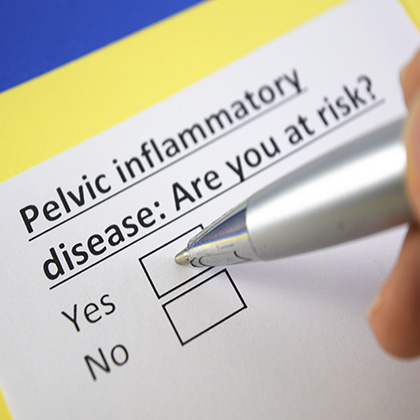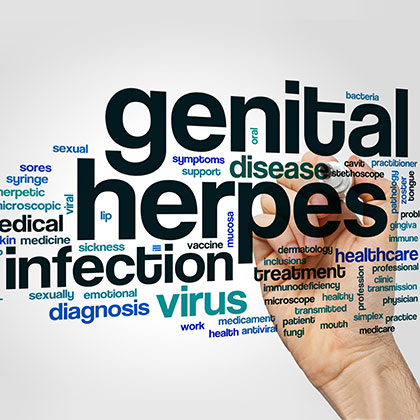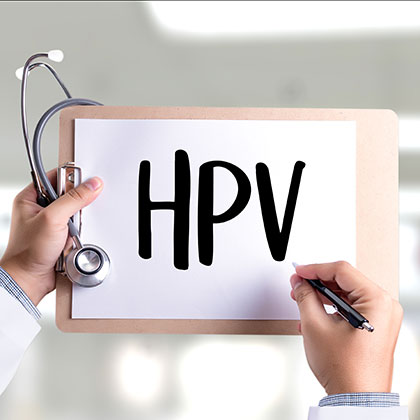
One of the most common sexually transmitted infections (STIs) in the UK, chlamydia can affect anyone who’s sexually active.
According to Patient the most current figures suggest more than 200,000 new cases of chlamydia are diagnosed each year in England (i). Younger people are most commonly affected – the National Institute for Health and Care Excellence (NICE) claims around seven in every 10 people diagnosed with chlamydia are aged 25 or younger (ii). Indeed if you live in England and are under 25 and sexually active, health experts recommend that you get tested for chlamydia every year or whenever you have a new sexual partner (iii).
You’re also at risk of getting chlamydia if you don’t use condoms or if you’ve had more than one sexual partner in the last year.
Bacterial infection
Chlamydia is caused by bacteria called Chlamydia trachomatis. These can live in the uterus (womb), vagina, cervix (womb entrance), urethra (the tube that carries urine out of the body from the bladder), rectum (back passage) and even sometimes the throat and eyes. They are passed from one person to another through unprotected sex (vaginal, anal or oral).
It’s also thought that the bacteria may be spread through contact with infected semen or vaginal fluid. This means you may not have to have penetrative intercourse to get chlamydia, as the infection may be spread through touching another person’s genitals. The infection may also be spread if infected semen or vaginal fluid gets in your eye. Alongside chlamydia, genital herpes is another sexually transmitted infection, although it is contracted virally.
Another way to get chlamydia is to share sex toys that aren’t washed or covered with a new condom with each use.
You can’t, however, get chlamydia simply by kissing or hugging someone or from sharing a towel with an infected person. Chlamydia also can’t be passed on through swimming pools or by sitting on toilet seats.
If you think you may have chlamydia, it’s important to get tested and treated as soon as possible, as the infection can cause serious complications if it isn’t treated early on. If you’re pregnant and suspect you have chlamydia, it’s vital that you get medical advice and treatment, as the infection can be passed to your baby.
What are the symptoms?
One of the major problems with chlamydia is that many people affected by it may not realise they have the infection. Experts believe seven out of 10 infected women and five out of 10 infected men don’t have any symptoms (i), so unless they get tested they don’t know they have the infection. Indeed you could have chlamydia for months or even years without realising it, during which time you could be passing it to others.
Some people, however, do experience symptoms. These usually start between one and three weeks after being initially infected – though some people don’t develop symptoms until months later. Occasionally the symptoms can start, then disappear a few days later. But it doesn’t mean the infection has disappeared too.
If you’re a woman with chlamydia you have just a 30 per cent chance of experiencing symptoms (i). The following are among the most common:
-
Pain when urinating
-
An unusual vaginal discharge
-
Pelvic or abdominal pain
-
Pain or bleeding during or after sex
-
Heavier-than-normal periods
-
Bleeding between periods
Meanwhile around half of all men with chlamydia will have some symptoms, the most common of which include:
-
Pain when urinating
-
An unusual discharge from the penis
-
Testicular pain and swelling
-
A burning sensation or itching in the urethra
If you have chlamydia in the rectum, it can cause discomfort and an unusual discharge. If the infection affects your eyes, it can cause redness, pain and a discharge. Chlamydia in the throat, on the other hand, isn’t common, and if you’re affected you won’t usually have any symptoms. If these symptoms don’t sound like yours, you might be experiencing gonorrhoea.
Getting tested
If you have any of the symptoms of chlamydia it’s important to get tested, as this is the only way you can be certain you have the infection.
If you’re at risk of having chlamydia but you don’t have any symptoms, it’s still important to get yourself checked out. You may, for instance, be at risk if you or a partner has recently had unprotected sex, if a sexual partner tells you they have a STI, or if you’ve been diagnosed with another type of STI. Even if your partner has tested negative for chlamydia, it’s important to have a test yourself too, as you may still have it.
Start by speaking to your GP about it. You can also get advice and tests from your local sexual health clinic (these are also often called genitourinary medicine, or GUM, clinics) and from some local contraceptive clinic. Find sexual health services near where you live.
The test itself is very simple. If you’re a man you’ll be asked to provide a urine sample. If you’re a woman you may be asked to wipe a small cotton bud called a swab inside your vagina, or you may have to provide a urine sample. The swab or sample is sent off to the lab, and your results should be ready in a week to 10 days.
Testing kits that you use yourself at home are also available. If you decide to use a home test kit, speak to your GP or pharmacist first, as some of them aren’t always very accurate.
If it turns out that you do have chlamydia, it’s important to tell any recent sexual partners that they need to get tested too. But if you prefer not to contact them yourself, the clinic can get in touch with them instead without giving out your name or any other details.
How is chlamydia treated?
Chlamydia is commonly treated with antibiotics, and according to the NHS more than 95 per cent of people with the infection will be cured if they take their antibiotics as prescribed (iv).
You may be given antibiotics before your test results are ready if there’s a very good chance you have the infection. Otherwise you’ll only get a prescription if your test results confirm you have chlamydia.
Several different types of antibiotics are prescribed for chlamydia, but the two most commonly used are azithromycin – which is given as two or four tablets that you take all at once – and doxycycline, which you take for a week in two capsules a day. Other types of antibiotics may be prescribed to women who are pregnant or breastfeeding, or to people who have allergies.
If you’ve been having any of the symptoms you should notice an improvement fairly quickly after being treatment, with symptoms usually disappearing within a week or two (if your symptoms persist, see your doctor or visit your local clinic again).
However it’s also important not to have sex until you and your partner or partners have completed your treatment. If you’ve been treated with azithromycin, it’s recommended that you avoid having sex for a full week, just to make sure you don’t catch the infection straight away again or pass it on to someone else.
Are there any complications?
If you don’t take antibiotics to treat a chlamydia infection, there’s a risk the infection could spread and cause potentially serious complications months or even years after you became infected.
In women the complications can include the following:
Pelvic inflammatory disease (PID)
PID can develop if the chlamydia infection spreads to other parts of the reproductive system such as the ovaries, uterus or fallopian tubes. This can cause a number of problems including an increased risk of ectopic pregnancy, infertility and long-term pelvic pain.
You may have PID if you have symptoms similar to those caused by chlamydia, such as pain during urination, bleeding after sex or between periods and discomfort or pain during sex. If you think you may be affected, speak to your GP or get medical advice as soon as you can, as PID can usually be treated easily if you catch it early on. You’re also less likely to experience problems such as infertility if you treat PID quickly.
Pregnancy complications
If you have chlamydia during pregnancy and aren’t treated for it, your risk of having a premature birth becomes higher than normal. You may also be more likely to have a baby with a low birth weight, and you may have a higher risk of having a miscarriage or stillbirth. You can pass the infection to your baby, which means they may be affected by complications such as eye and lung infections.
Chlamydia in women does not, however, cause cervical cancer.
Men with untreated chlamydia may also experience complications, including…
Epididymo-orchitis
This is an infection of the testicles and the tubes that carry sperm from the testicles, called the epididymis (another word for epididymo-orchitis is epididymitis). The symptoms include sudden or gradual pain in one or both testicles, a swollen scrotum (the bag of skin that contains the testicles) and a lump or swelling around a testicle caused by a build-up of fluid.
Again, a course of antibiotics is the usual treatment. Not treating epididymo-orchitis effectively, however, may cause fertility problems.
Sexually acquired reactive arthritis (SARA)
Chlamydia is the most common cause of SARA, a condition that causes inflammation in the joints, eyes or urethra. Symptoms usually flare up within a few weeks of being infected with chlamydia, and while SARA is more common in men, it can affect some women with chlamydia too. There is no cure, but the symptoms can be treated and usually subside within a few months.
How to prevent chlamydia
There is only one foolproof way of preventing chlamydia, and that is to abstain from vaginal, anal and oral sex. You can, however, reduce your risk of catching or spreading chlamydia to a large extent by doing the following:
-
Always use a condom when having vaginal, anal or oral sex.
-
Never share sex toys, or wash them or cover them with a new condom each time they’re used by a different person.
-
Always cover female genitals during oral sex with a piece of soft plastic or latex, called a dam.
Natural support for chlamydia
If you’re being treated with antibiotics for a chlamydia infection there are a few natural supplements that could give your immune system a boost, helping your body to recover effectively:
Live bacteria
Experts believe live bacteria – also called ‘friendly’ bacteria or probiotics – may help regulate and support the immune system (v). These live bacteria are thought to help restore the natural balance of bacteria in your gut.
Many natural health practitioners recommend taking probiotics if you’re being treated for an infection with antibiotics. That’s because antibiotics can often wipe out the protective gut bacteria as well as the bacteria that’s causing the infection you’re being treated for. Depending on the live bacteria supplement you use, you may usually be able to take it at the same time as your antibiotics or an hour or two later.
High-strength multivitamin and mineral
As well as having a healthy diet, taking a high-strength multivitamin and mineral supplement may help make sure your immune system is getting all the nutrients it needs to stay as strong and effective as possible, especially when dealing with infections. Make sure any supplement you take includes good levels of zinc, which is thought to be important for immune function (vi) as well as vitamin D (vii).
Elderberry juice
Another supplement that may be useful for immune health is elderberry extract as it contains powerful antioxidants called anthocyanins. There is also evidence to suggest that black elderberry extract may increase the body’s production of chemical messengers within the immune system called cytokines, suggesting it has an immune-enhancing function (viii).
Vitamins B and C
Both of these vitamins support the normal functioning of the immune systems. But despite the fact that they’re found in a wide range of everyday foods, many of us may be running short. To make sure you’re getting the level of the B and C vitamins your immune system needs, you may want to consider taking a high-quality B complex supplement as well as a high-quality vitamin C supplement. You can also get both nutrients in good levels in a quality multivitamin and mineral formulation.
Managing an STI can be difficult, but with this guide, we hope to make it a little easier. To discover more information on a number of other common health conditions, visit our health library for some helpful advice.
References:
-
Available online: https://patient.info/sexual-health/sexually-transmitted-infections-leaflet/chlamydia
-
Available online: https://cks.nice.org.uk/topics/chlamydia-uncomplicated-genital/background-information/prevalence/
-
Available online: https://www.nhs.uk/conditions/chlamydia/
-
Available online: https://www.nhs.uk/conditions/chlamydia/treatment/
-
Yah, F., Polk, BD. (2011 Oct). Probiotics and immune health. Curr Opin Gastroenterol. 27(6): 496–501. Available online: https://www.ncbi.nlm.nih.gov/pmc/articles/PMC4006993/
Chiang, B.L., Sheih, Y.H., Wang, L.H., et al. (2000). Enhancing immunity by dietary consumption of a probiotic lactic acid bacterium (Bifidobacterium lactis HN019): optimization and definition of cellular immune responses. Eur J Clin Nutr. 54:849-855.. Available online: https://www.ncbi.nlm.nih.gov/pubmed/11114680
Aziz. N., Bonavida B., Activation of Natural Killer Cells by Probiotics. For Immunopathol Dis Therap. 2016;7(102):41-55. Available online: http://www.dl.begellhouse.com/journals/1a654bf03faf67ac,2451af3842dace87,4072614f2000aab7.html -
Chandra, R.K. (1985). Trace element regulation of immunity and infection. J Am Coll Nutr. 4:5-16. Available online: https://link.springer.com/chapter/10.1007/978-4-431-68120-5_23
Fraker, P.J., Gershwin, M.E.,Good, R.A., et al. (1986). Interrelationships between zinc and immune function. Fed Proc. ;45:1474-1479. Available online: https://pubmed.ncbi.nlm.nih.gov/3485544/ -
Aranow, C. (2011 Aug). Vitamin D and the Immune System. J Investig Med. ;59(6):881-886. Available online: https://www.ncbi.nlm.nih.gov/pmc/articles/PMC3166406/
-
Barak, V., Halerpin, T., Kalickman, I. (2001 Apr-Jun). The effect of Sambucol, a black elderberry-based, natural product, on the production of human cytokines: I. Inflammatory cytokines. Eur Cytokine Netw. ;12(2):290-6. Available online: https://www.ncbi.nlm.nih.gov/pubmed/11399518
Related Posts
Disclaimer: The information presented by Nature's Best is for informational purposes only. It is based on scientific studies (human, animal, or in vitro), clinical experience, or traditional usage as cited in each article. The results reported may not necessarily occur in all individuals. Self-treatment is not recommended for life-threatening conditions that require medical treatment under a doctor's care. For many of the conditions discussed, treatment with prescription or over the counter medication is also available. Consult your doctor, practitioner, and/or pharmacist for any health problem and before using any supplements or before making any changes in prescribed medications.

Christine
Christine Morgan has been a freelance health and wellbeing journalist for almost 20 years, having written for numerous publications including the Daily Mirror, S Magazine, Top Sante, Healthy, Woman & Home, Zest, Allergy, Healthy Times and Pregnancy & Birth; she has also edited several titles such as Women’ Health, Shine’s Real Health & Beauty and All About Health.
View More



